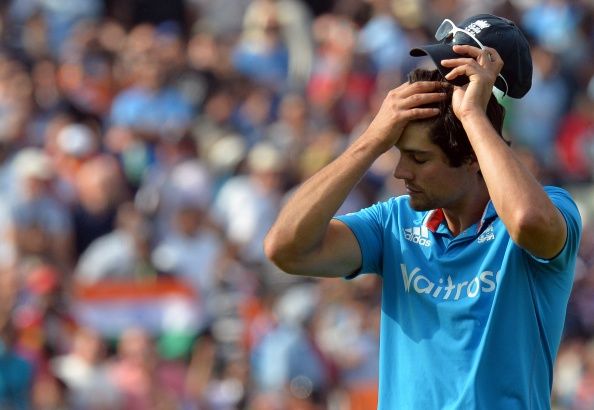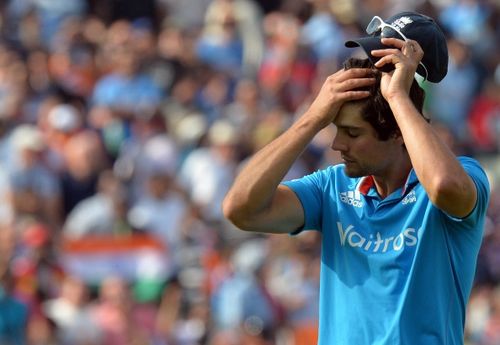
Why Alastair Cook desperately needs lessons from MS Dhoni in learning to control his emotions

Alastair Cook came up with a series of illogical statements while defending his position on not stepping down as England’s ODI captain, post the team’s humiliating defeat in the 4th ODI at Edgbaston. Clearly running out of ideas, Cook tried to relate England’s recovery from 0-1 to 3-1 in the just concluded Test series to the mauling they are currently receiving in the ODI series. The point he was trying to make – ‘things change very quickly in sport.’
The ODI series has been lost
With just one match remaining in the ODI series, there is no scope for ‘quick change’, and the best England can do is to equate India’s 1-3 result of the Test series. To make things worse, he came close to outright lamentation, grumbling that irrespective of which team he plays in, his place is always in question, and that is a hard situation to work in.
Considering this latest outburst, which comes just days after his vociferous expression of disappointment on Graeme Swann’s observation that England have no chance to win the 2015 World Cup, the English captain would do well to take a crash course from Indian captain MS Dhoni on learning to rein in his emotions.
Going by his highly unemotional standards, Dhoni had a relatively weak moment in England during the Test series, when he stated that he was ‘deeply hurt’ over Ravindra Jadeja being fined 50 percent of his match fees, the initial verdict in the long-running Jadeja-Anderson saga which grabbed more eyeballs than several on-field events during the series. Even so, there seemed a definite tactical motive to this statement.
That of exerting additional pressure on the ICC before the Anderson verdict; the move, if intentional, may have failed, with England walking way the happier of the two warring parties. But even while displaying emotions, Dhoni’s logic was firmly in place – he argued that such a fine would encourage players to resolve matters in an ungainly fashion as opposed to reporting it to authorities. This is where he differentiates himself from several other captains on the international stage, and highlights the gulf between him and Cook when it comes to channeling emotions in the right direction.
No facts to back his statements
Cook needs to get his facts and his logic correct before embarking on crude statements, which, if they continue coming, will seriously undermine his credibility. Although he had a poor average in Test matches in 2014 (prior to the Southampton Test, when Jadeja dropped him on 15, and seemingly gifted him and England a new lease of life, the 29-year-old averaged 14.33 in 5 Test matches in 2014).
Cook’s pedigree in the longer version of the game was never suspect. His achievements in Test cricket – 25 Test centuries in less than 100 matches, 2nd youngest to reach 5000 Test runs (behind Sachin Tendulkar), youngest to reach 8000 Test runs (beating Tendulkar’s record by 21 days), etc., are no mean feats; irrespective of where he goes from here, he will always be hailed as a great Test cricketer. This is why, despite a lean patch in 2014, though some people were baying for his blood, I never thought his place in the English Test squad was seriously in doubt, at least for a couple more series. Therefore, it was that much easier to inspire confidence in the rest of his team-mates to lift their game when they got an opportunity, and stage a spectacular comeback.
The story is completely different in ODIs; his overall statistics, 3,039 runs in 85 matches at an average of 37.51 are not really impressive by any stretch of imagination, given the abundance of current players in the 40+ and even 45+ batting average bracket. If we remove the most fruitful years of his ODI career, 2011 (600 runs at an average of 46.15) and 2012 (663 runs at an average of 47.35), his batting average over the remainder of his ODI career (2006-date) is below 33, which is definitely not worthy of an international captain.
Since 2012, England have won only a single series against another Test playing nation, and lost the previous four ODI series at home. Unless he hits a purple patch like 2011-12, he is unlikely to inspire his team-mates to reverse their ODI fortunes, and therein lies the difference between his Test and ODI credentials. In Tests, team-mates believe that he is among the best, and a slump in form is an aberration; in ODIs, he will be considered mediocre or above average at best, with good performances being considered an aberration.
Cook needs to control his emotions
His illogical arguments are getting further accentuated by his recent abject whining – his disappointment at ‘friend’ Swann’s straight talk, or the difficulties of being constantly under pressure to secure his place. Dhoni has gone through some immensely difficult moments in his cricketing, particularly Test career, especially after getting blanked 0-4 by both England and Australia during the 2011-12 season, and even now, post the humiliating series defeat in England; handling the amount of criticism being hurled at him from all possible quarters is a testimony of his mental strength – and that is what Cook needs to learn from his counterpart.
I wouldn’t necessarily endorse Dhoni’s unemotional demeanor at all times – Sourav Ganguly never minced his words, and his words were often emotional, but on no occasion did he whine. Taking inspiration from Bruce Lee’s words, it’s high time Cook differentiates between ‘emotional content’ and actual emotions like anger; in this case, disappointment.
To conclude, Cook deserves every bit of flak he is currently getting, and outside the field, his communication can take either of these routes – the Dhoni care-a-hoot methodology, which entails a deadpan expression, occasional smiles, measured conversation and logical quips; or, if he has it in him, he could follow the Ganguly methodology, expressing his opinions strongly and explain why he still needs to be a part of the team.
What he definitely shouldn’t do in public is whine about the ‘injustice’ being meted out to him. Irrespective of what happens on-field, he continues to be the representative of his country at an international level, and an exhibition of his disappointments to the general public would just be perceived by his teammates as a sign of weakness.
In this context, my memory throws up the image of Virat Kohli complaining about the Wankhede crowd booing him during an IPL 2013 match against Mumbai; he is a fantastic cricketer, but this incident exposed his limitations as a captain capable of keeping his emotions under check - which is why, I am never in doubt when it comes to the Dhoni vs. Kohli captaincy debate.
Getting back to the original debate, Alastair Cook’s stocks are currently very low, and the least he can do is be honest about his evident failings, especially in the shorter format; whether he steps down or not is left to him or the Board, but such parading of personal insecurities can further demoralize the team and go a long way in making Swann’s prediction coming true.